TTT: Bk 4, Ch 4
Of Herbs And Stewed Rabbit
"'What's taters, precious, eh, what's taters?'
'Po-ta-toes,' said Sam"
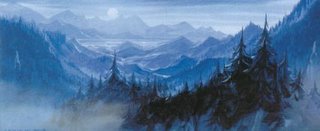 Smeagol and the hobbits head south along the main road through the land of Ithilien, "a fair country of climbing woods and swift-falling streams". Ithilien, the sindarin word meaning "Land-of-the-Moon", was the easternmost province of Gondor that lay between the river Anduin and the Mountains of Shadow. Founded by Isildur in the year 3320 of the Second Age, the city of this land was Minas Ithil which was now Minas Morgul. In the year 2002 of the Third Age, Ithilien fell to the Witch-King and the forces of Sauron after suffering assaults from all
Smeagol and the hobbits head south along the main road through the land of Ithilien, "a fair country of climbing woods and swift-falling streams". Ithilien, the sindarin word meaning "Land-of-the-Moon", was the easternmost province of Gondor that lay between the river Anduin and the Mountains of Shadow. Founded by Isildur in the year 3320 of the Second Age, the city of this land was Minas Ithil which was now Minas Morgul. In the year 2002 of the Third Age, Ithilien fell to the Witch-King and the forces of Sauron after suffering assaults from all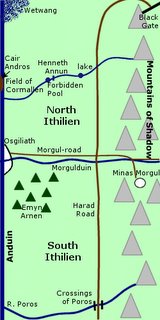 directions. Over the following millennium, however, guerrilla forces of Rangers kept a presence in Ithilien operating out of secret refuges. They were the first line of defense against any attack from Mordor.
directions. Over the following millennium, however, guerrilla forces of Rangers kept a presence in Ithilien operating out of secret refuges. They were the first line of defense against any attack from Mordor.Unlike the lands to the north, Ithilien was not wholly ruined. In fact, much of the northern portion remained unscathed. Sauron's forces remained mostly within the confines of Mordor and seemed to use only the north-south Harad road that Frodo, Sam and Smeagol now traveled. The most visible scars lay along that road. Signs of Orcs lay in the trees as marks made by their crude strokes and much of the land grew wild and untamed with briar and bramble creeping over the other plants many of which were unknown in the Shire. But in this more southerly part of Middle-Earth, spring was already settling in and the smell of new growth was refreshing to Frodo and Sam, though not to Smeagol.
Sam decides to put Smeagol to use and sends him off to get them something to eat. Smeagol is only too happy to comply and bounds off in search of something more appealing than the lembas bread. It isn't long before he returns with two young rabbits, freshly killed. Sam decides it's
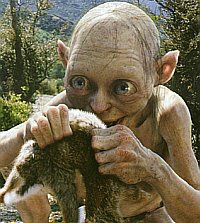 time to put his pots and pans to use and orders Smeagol to fetch some water. But Smeagol finally understands what Sam intends when he returns to see the hobbit stoking a fire. Smeagol is appalled, for he had intended to eat the meat raw. In his mind, cooking the rabbits would ruin them.
time to put his pots and pans to use and orders Smeagol to fetch some water. But Smeagol finally understands what Sam intends when he returns to see the hobbit stoking a fire. Smeagol is appalled, for he had intended to eat the meat raw. In his mind, cooking the rabbits would ruin them.Nevertheless, Sam is calling the shots and cooks up a stew for his Master, who is fast asleep. The exchange is classic and Peter Jackson's The Two Towers recreates it quite well. Sam tells Smeagol to root up some 'taters to go with it. Smeagol asks "What's taters, precious, eh, what's taters?" Sam replies in mock exaggeration, "Po-ta-toes". In the film, however, Sam muses over some tasty taters and filches the line from The Hobbit of the trolls who were deciding how to eat Bilbo and the Dwarves: "Boil 'em, mash 'em, stick 'em in a stew." Frodo wakes to have the first hot meal he's had in quite some time.
While he may not have been aware of it, Sam was trying to lure Smeagol back towards the characteristics of the hobbit-like creature that he once was. If the obsession with the Ring degenerated him into his current state, perhaps his association with Frodo and Sam could to the opposite. Surely at one time Smeagol relished a good hot home-cooked meal instead of scrounging for raw meat. He rejects Sam's overtures, however. At this point the reader may begin to wonder if there is any hope for Smeagol or if he is simply too far gone into wretchedness. In fact, Sam's response is "Oh you're hopeless." But if Sam can't help Gollum, he's certainly going to do everything possible to keep his Master connected to the life that he left behind in the Shire and prevent him from a heading toward a similar fate.
Later, as Sam goes off to the stream to wash his cooking gear he notices that he unintentionally left the fire smoldering. Alarmed, he heads back to the camp and he thinks he hears a strange whistling. There are also voices. When Sam gets back to Frodo, they suddenly see four men emerge from the woods. They were hooded and all dressed in green. Frodo thought of Boromir, for they were much like him - especially one in particular. Having never seen hobbits before, they are curious yet cautious. The leader introduces himself as Faramir, Captain of Gondor. He asks them who they are and Frodo tells them briefly of the Fellowship, which included a man of Gondor named Boromir. All of the men react, for they know this name.
Faramir is curious to know more of their journey but he must depart and tend to other pressing matters. He leaves two of the men, Mablung and Damrod to stay with the hobbits. Frodo and Sam listen to their conversation and learns that the men are on guard against Orcs and Men of the south who are journeying north towards the gate of Mordor. Frodo is surprised to hear them speak in a language similar to the Elven-tongue and deduces that they are Dunedain of the South, men of the line of Westernesse.
The introduction of Faramir will take Frodo and Sam on a detour that was unforeseen by Tolkien. As he wrote out his original draft, the character just sort of sprang out of his imagination without any clue as to his relevance. As Tolkien writes in a letter to his son, Christopher on May 6, 1944 (Letter no. 66):
"A new character has come on the scene (I am sure I did not invent him, I did not even want him, though I like him, but here he came walking into the woods of Ithilien): Faramir, brother of Boromir"Because of Faramir, all that takes place in the following two chapters in a part of the story that was never part of the author's outline. And before Tolkien finally decided on making Faramir Boromir's brother, he had named him Falborn, son of Anborn. Andborn actually becomes the name of the fourth man that come upon Frodo and Sam. But of course, the inclusion of Faramir becomes an extremely important one involving several crucial plot points.
All of a sudden, there is a great cacophony off in the distance that Sam describes as being "like a
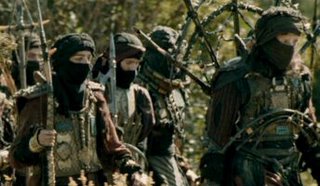 hundred blacksmiths all smithying together". An army of dark men were being pursued by many more of the green-clad Rangers. One of the southerners, dressed in scarlet robes with hair braided with gold, comes crashing through the trees at Sam's feet. This is Sam's first view of a battle and he looks upon the dead face of the man.
hundred blacksmiths all smithying together". An army of dark men were being pursued by many more of the green-clad Rangers. One of the southerners, dressed in scarlet robes with hair braided with gold, comes crashing through the trees at Sam's feet. This is Sam's first view of a battle and he looks upon the dead face of the man. "He wondered what the man's name was and where he came from; and if he was really evil of heart, or what lies or threats had led him on the long march from his home; and if he would not really rather have stayed there in peace - all in a flash of thought which was quickly driven from his mind."Here Tolkien touches again upon the concept of free will and considers how much that played in this man's presence in a foreign land, rallying with his army to Sauron. Originally, the man was to have been a Gondorian but Tolkien made the change to allow for this speculation. There is nothing mentioned in anything that I have read about Tolkien's life, but I've often wondered if these very thoughts passed through his mind about the soldiers of the German army that he fought back in WWI. In any event, these words are given to Faramir in the film version of The Two Towers.
In the midst of the battle Sam sees something else that he can't believe. Lumbering towards
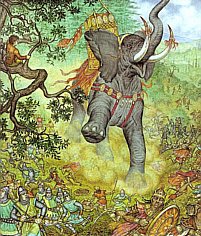 him is a huge Mumak, which is basically a giant elephant. Sam's only experience with these creatures are from legend, where back home they are called Oliphaunts. A huge war tower strapped to its back, the Mumak shakes off the arrows fired at him, most of which bounce off its tough hide. It stampedes through the woods and is soon lost to Sam's view. He never finds out what becomes of it. As the Rangers regroup, Mablung tells Frodo and Sam to stay with them, for more forces of the enemy will be looking for them. Not to mention that Faramir would like to spend a little time with them.
him is a huge Mumak, which is basically a giant elephant. Sam's only experience with these creatures are from legend, where back home they are called Oliphaunts. A huge war tower strapped to its back, the Mumak shakes off the arrows fired at him, most of which bounce off its tough hide. It stampedes through the woods and is soon lost to Sam's view. He never finds out what becomes of it. As the Rangers regroup, Mablung tells Frodo and Sam to stay with them, for more forces of the enemy will be looking for them. Not to mention that Faramir would like to spend a little time with them.------
[Chronology: March 5th - March 7th 3019 T.A.]
------
Next: The Window On The West
(revised 9/30/06)


2 Comments:
The people who accuse Tolkien of racism -- because of his frequent use of the color black, as well as the geographical south (which for an Englishman, would mean Africa) as identifiers of evil -- fail to notice this passage in which Sam contemplates the dead Southron.
I'm convinced those are Tolkien's personal thoughts, put into Sam's head. No doubt he, having seen war, had often had thoughts along those lines.
(In other words, those who accuse Tolkien of racism are reading into the text something which isn't there, or they are projecting.)
Post a Comment
<< Home